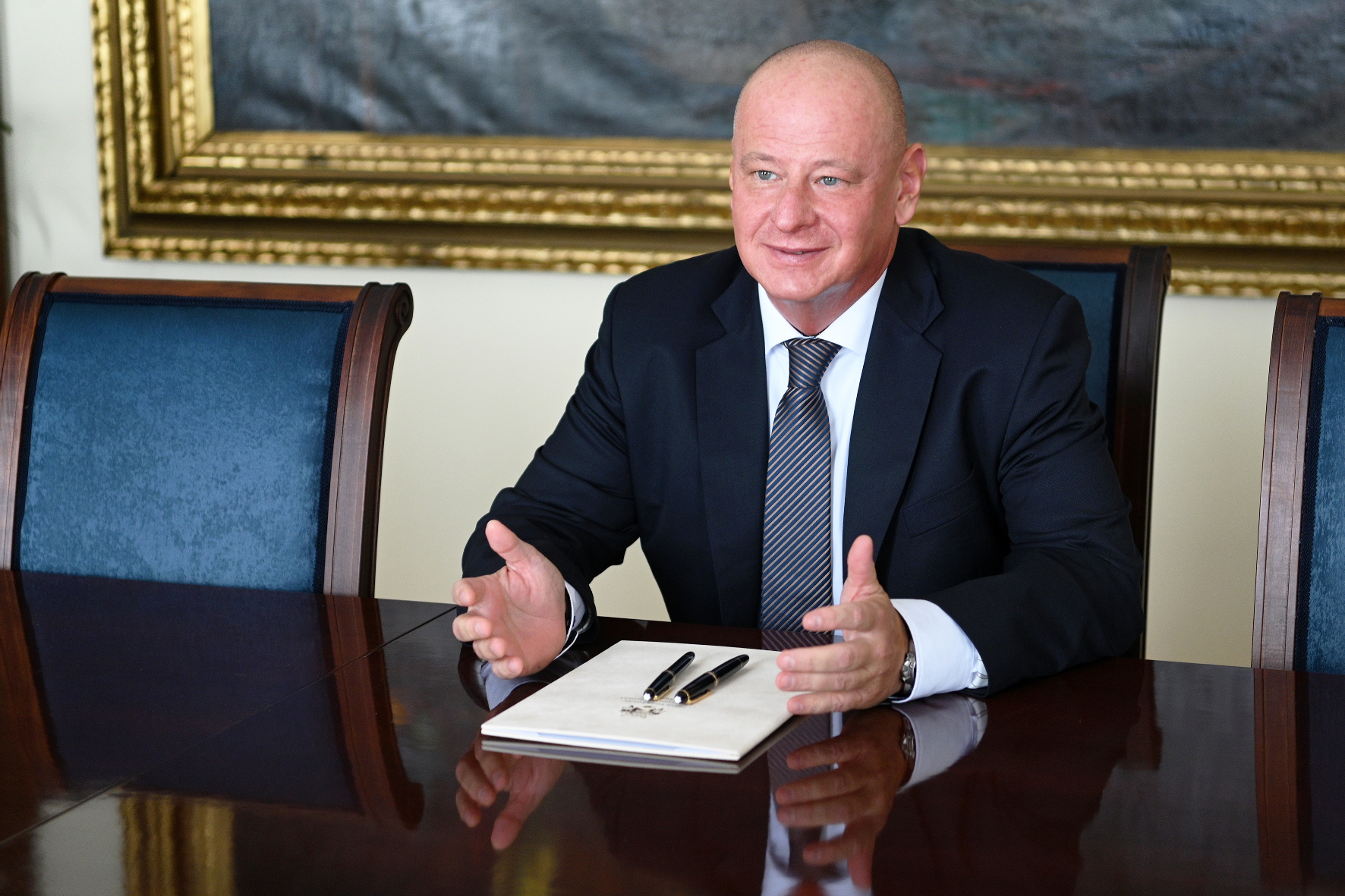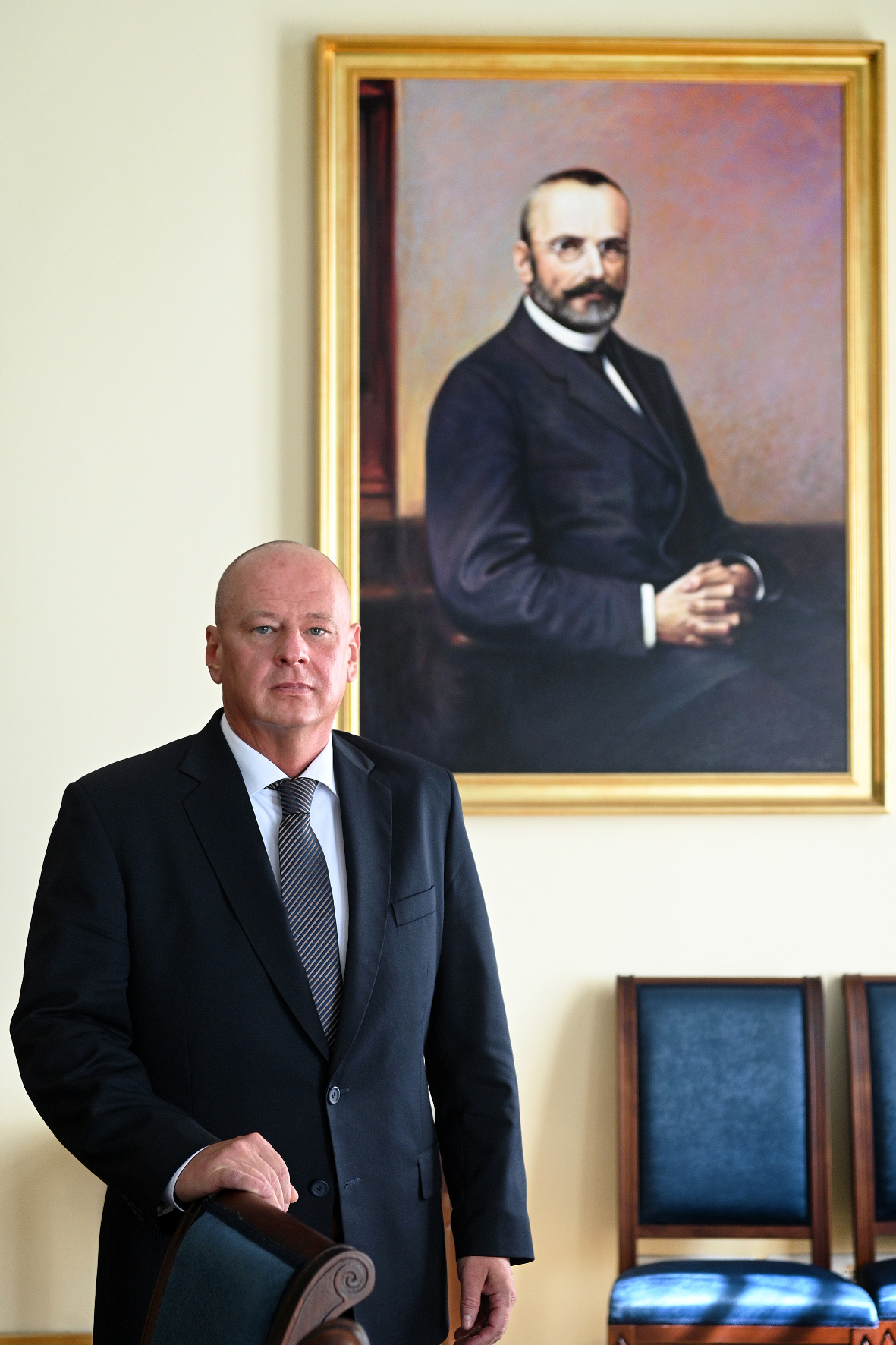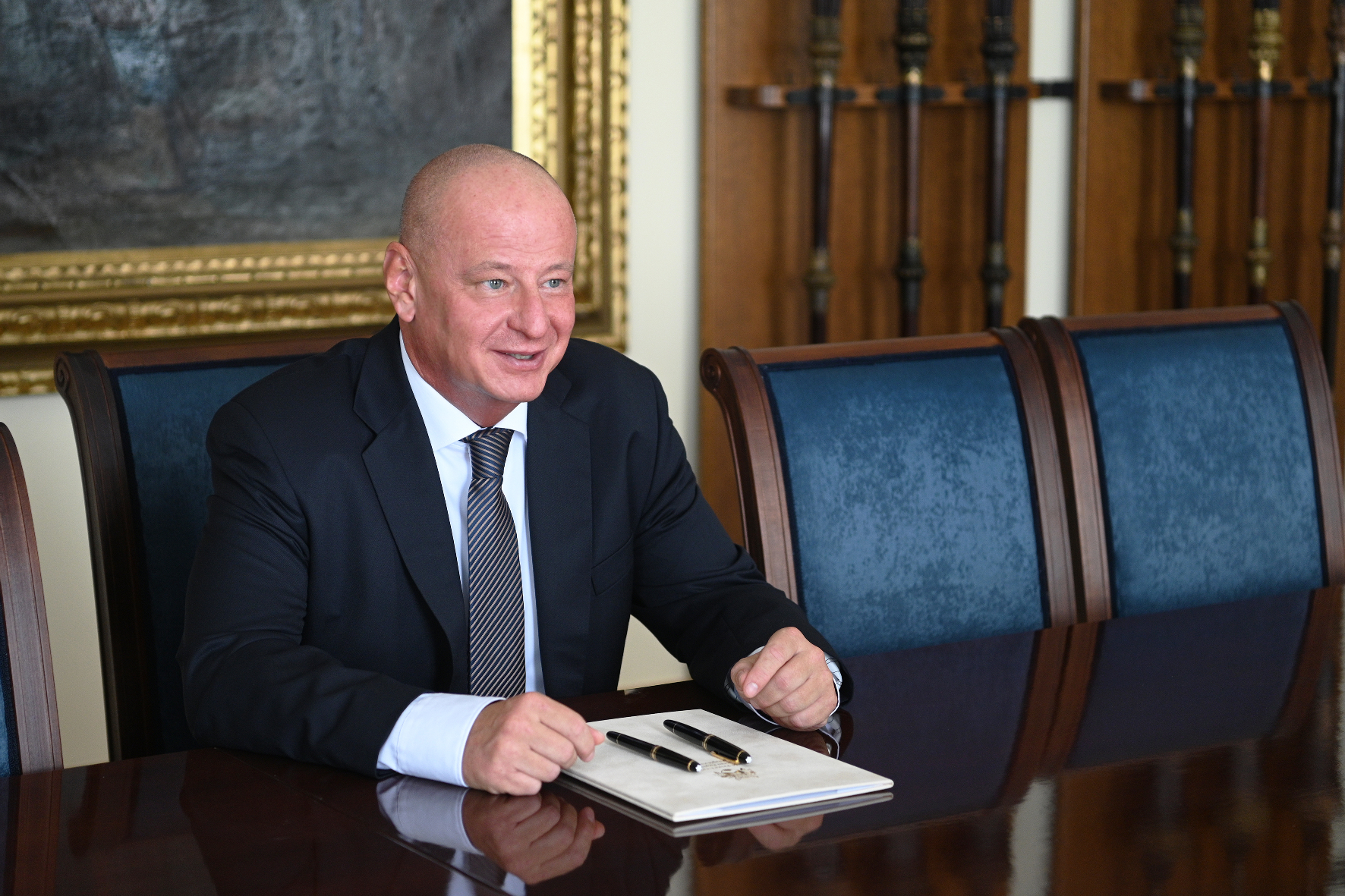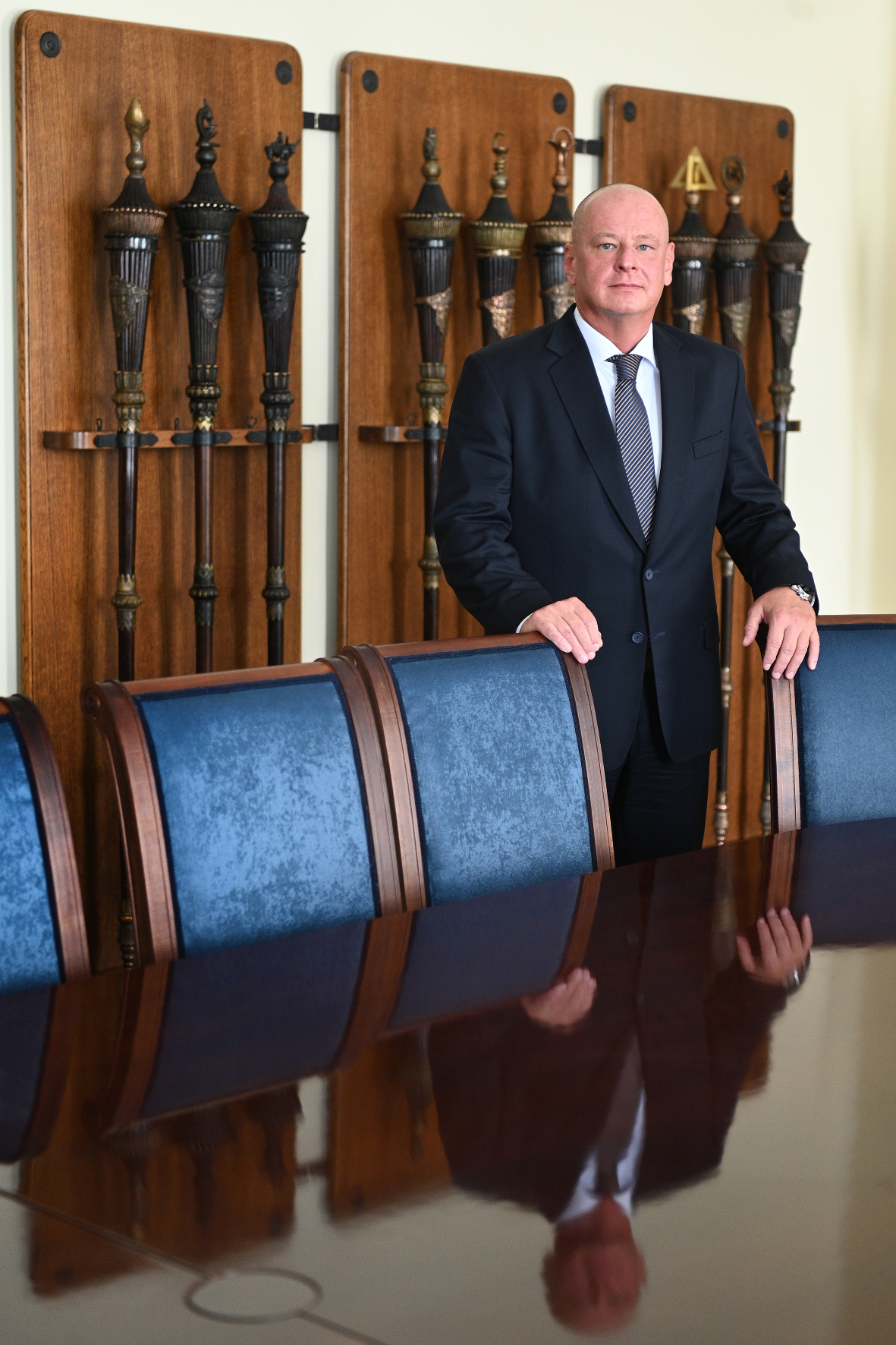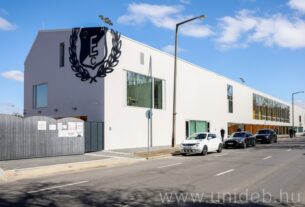The University of Debrecen has undergone significant development in recent years: it has established campuses, strengthened its international relations and is constantly expanding research, educational and infrastructural opportunities. The aim of the institution is to become a leading university at the European level as well. Debrecen Sun has had a conversation with György Kossa, the chairman of the board of trustees of the Gróf Tisza István Foundation of the University of Debrecen – which maintains the institution – about the future of the university as well as the challenges of higher education and social responsibility.
What changes did the change of model bring to the life of the university, and what kind of changes are you expecting in the near future?
One of the biggest achievements of the last years is that the university managed to implement its first six-year institutional development plan. One of the keys to this was that in the new model a decisions could be made locally, as well as the institution had got its own maintenance and true autonomy. We have no longer have to fight for the budget every year, but based on long-term plans the university can function. The state treats it as an equal partner at the legal level institution, so the university is no longer just a budgetary body, but a contractual one, an independent entity operating in a legal relationship. This is a huge improvement compared to the past decades. If we look at it in a historical perspective, in 1947, when the university was nationalized, a bad decision was made: the previous university, which a was a unified institution, was divided into three separate parts. This hindered scientific collaborations and the development of synergies. Recognizing this, the university correctly decided in favor of integration in the early 2000s.
After the 2021 model change, the University of Debrecen was the first in Hungary to place its employees under the Labor Code and it created a career path model. One of the most important elements of this was the reform of the wage system: an immediate 80% wage increase happened among the instructors, 50% of which was performance-based. If the goal is an excellent performance, then an incentive system must also be provided for this. In addition to wages, we are also planning social measures that contribute to students’ and employees’ living conditions and well-being.
Which means?
One of our important goals is the expansion of dormitories, which includes 600-1000 new ones,
we would create new places in the coming years. According to our plans, dormitories reserved for students in need would be separated from the advanced, business-based student accommodations. This would not only improve the situation of the students, but also of the university, it would give stability, since the accommodations themselves must operate sustainably, moreover its residents take advantage of university courses.
In addition, we are also working on the development of a home or a park for the elderly, which is primarily for employees who have grown old at the university and have retired. It could provide a solution if needed. Many educators and researchers spend their whole lives in science, but they have no family to take care of them anymore. One of these institutions could provide them with a dignified and safe environment. We hope that we will manage to do this in the near future.
What changes have taken place in the scholarship system?
The university is committed to nurturing talent. With the support of the foundation the institution has created different scholarships to support the best students and researchers. We provide job offers for the best 70 students, as well as the the three best ones receive research support (grant) annually, the amount of which is HUF 5 million for the the one in the first place. In addition, we introduced the Gróf Tisza István Foundation for the University of Debrecen Award, which is given to a teacher who performs outstanding scientific activity in the given year. The recognition also comes with a HUF 300,000 monthly subsidy, five winners will receive this for a year.
We also encourage scientific publications: researchers who publish in D1 or Q1 accredited journals can receive a significant financial support. These measures contribute to strengthening the university’s international recognition.
What about the issue of funding and university autonomy?
An important goal of ours is to diversify our income and not rely exclusively on state funding. The university’s autonomy creates an opportunity to be economically viable, as well to have a stable foundation while we think about long-term developments.
In our next six-year institutional development plan, we are allocating HUF 48 billion to to finance scientific and innovation activity, which can give a huge boost to the university’s research community. All this is in accordance with the state, with our contracts, which link funding to performance-based indicators.
If universities could not continuously renew themselves, they would gradually fall behind. The Monitoring Committee of the Council of Europe, headed by Mr Papandreou, former Prime Minister of Greece has visited us recently. The Commission also participated in the delegation, its secretary – a French specialist – as well as an Estonian representative. We discussed the merits with them. The discussion was extremely fair and constructive, which the common press conference also confirmed.
The former Prime Minister stated clearly: the University of Debrecen is fine. At a press conference, I asked him to use all the tools at his disposal in order to end the unfair situation affecting Hungarian higher education. It is sad that some universities are sometimes used as tools by politics. This was previously done and I also said on television: higher education institutions should not be used for political purposes. Science and education serve the development of humanity, not individual or political interests. The goal of international cooperation is to improve the quality of life, and not to gain short-term political benefits.
How do you see the case of the suspended Erasmus and Horizon programs?
There are also serious misunderstandings regarding the Erasmus and Horizon programs. It is important to clarify that universities are only administrative mediators in these cases, grants go directly to students and researchers. Universities are financially not beneficiaries of these programs, so the decisions taken against them are not only bad, but also unjustified.
All of this can clearly be traced back to political motivations. I say it as not a political statement, but as a fact. The University of Debrecen is suing the Council of the European Union – an important difference is that the monitoring committee that visited us was an organization of the European Council and it is a broader organization than the Council of the European Union, because it includes every European country.
Independent, international expert analyzes also confirm that the autonomy of the University of Debrecen is outstanding in Europe. An analysis created by an international expert company shows that according to academic, organizational, management and employer autonomy the University of Debrecen as an institution is in the first two places in Europe in the national ranking, and in a single area it ranks eighth.
During the negotiations, the Prime Minister admitted that he also had difficulties as a politician caused by ensuring greater autonomy of universities in Greece. There were also present two of the representatives of countries that are in one of the last places on the list, and I also asked the question: if our university’s autonomy is at the highest level in Europe, what are we even talking about?
The foundation that maintains the University of Debrecen, for example, has a five-person decision-making body, three members of which are university citizens. And in the control board, two out of three members are university citizens, and one of them is delegated by the Senate. This means that the university’s advocacy ability is largely assured. Due to this, the claim that the autonomy of universities is damaged completely lacks any base.
Although politics tries to block European funds from Hungarian model changers interfere with university autonomy, it could not prevent research and collaborations. More than a thousand international research projects are currently underway at the university. From a financial point of view, it was not possible to cause any damage either, as the university replaced resources and it also compensates for any lost resources, even if not completely, but it can operate the system.
The goal is to ensure the stable and sustainable operation of the university, as well as value of diplomas on the labor market should continuously increase. The property of the University of Debrecen is no longer in asset management, but the ownership is listed in university books. This ensures true autonomy and economic stability. Therefore, every member of the university’s community – from the janitor to the rector – is an owner.
What international collaborations does the University of Debrecen currently participate in?
We are experiencing increasing support from foreign universities. Many institutions cooperate with us specifically out of defiance, thereby indicating that they do not agree with political decisions affecting universities. Universities are also in international competition, as higher education is now on the global market. Every country tries to train the best specialists, it also affects GDP growth. We want to compete with universities, but we want to compete on the international stage to move forward.
Our goal is to overtake institutions such as the Károly University in Prague or the Jagiellonian University in Krakow. In some indicators, this has already been achieved, in fact, in the most recent QS in the sustainability ranking, the University of Debrecen is the only Hungarian university which was included in the world’s top 100 institutions in the environmental impact category in the field of sustainability.
The university’s aim is to create exchange programs with the world’s most important institutions. Negotiations are going on currently with several outstanding universities, for example:
- with the largest agricultural university in the United States about an agricultural program,
- with the Karolinska Institute and Oxford
- on supporting the study trips abroad for the most talented students, within which the university would pay the tuition fees, and the students would contractually agree to return to the institution and their knowledge is applied at home.
The board of trustees and the university management must not think in a short term. As I stated in one of the discussions: if there was a university for 500 years, then let it be 500 years from now.
What is the mission of the university now?
Such an institution must move along values, and the most important value is the human itself. The university must never forget this. One of the foundations of our mission is that we make up for the value deficit, both at the level of young people and the wider community. This is not a political issue, but it is about what the real values are. I have recently read a study that found that in the United States, between the ages of 26 and 60 20-25% of the people did not have any human interaction in one year. This alarming data show where the loss of values can lead.
As a university, we must represent values. That is why it is important that our instructors do not influence the worldview of the students, but introduce them to different points of view and let them form their own opinions. A young man thinks differently at the age of 20 than at the age of 50, and he should be left with the the opportunity to make decisions based on their own experience. The university must strive to maximize the value of the diplomas on the labor market. In addition, we hope that a generation will grow up that will return to human and community values and will realize that happiness is not only a question of money.
Today we see that a part of society follows wrong values. A parent saves for years, so that his child can get his own apartment, but the young person says: “I don’t want to live in a block of flats, I’m not moving in.” This means a loss of value, since the apartment is the hard work of the parents. Knowledge itself is a huge asset, from which a person can live his whole life. Students should come to the university to acquire knowledge, and that should remain in focus – regardless of whether the education is provided by their parents, the state or their work.
Has the role of companies in talent management increased?
During my career, I have noticed that internal talent management fades into the background. In the past, large companies recognized their own talents and helped them to develop. Today, many companies are looking for external labor instead of their own. Through my own example, I can see how important development within the organization is. In a large organization, you have to give someone the chance to be a leader from a lower position – of course, this requires knowledge and it takes a lot of work. The university must also recognize its own talents, if an institution like this cannot do this, then who else would?
Life is continuous learning. “Lifelong learning” is not just a buzzword, it’s one real life experience. Everyone makes mistakes – anyone who says they’ve never made a mistake he is not telling the truth. Young people also learn through experience. When our parents and grandparents warned us we did not pay attention and later we stepped into the same “mud”. This however, is part of life, and that is why it is important for organizations to recognize the risks and learn from them.
Every organization – including the university – has to deal with a number of risk factors, for example:
- Human risk (e.g. shortage of professionals, aging of teaching staff),
- Economic risk (e.g. financing challenges),
- Legal risk (e.g. regulatory changes),
- Professional risk (e.g. sustainability of innovation and research areas).
Mistakes are natural, but they should not be intentional or repetitive. If someone makes a mistake, you don’t have to trample them, but help them learn from it. The best professionals are often those who have already experienced failure, because they know how to avoid it.
How does decision-making take place?
In the case of such a large institution, decisions are not in the hands of a single person. The board of trustees also makes board decisions because there is neither a single person nor who has the “philosopher’s stone”. If a dispute arises on an issue, it must be resolved by negotiation and we must reach a common denominator. In the case of a university, the core activity – education and research – cannot be a subject of debate, since this is the basis of the institution’s operation.
Building the right risk management systems is crucial. In the field of numerous industries – for example in the car and aircraft industry – strict quality assurance and risk management principles work. The most important principle for an airplane is security. If the braking system of a car or airplane is faulty, it can cost lives. The same is true for a university. Although the risks here are of a different nature, regulation, quality assurance and responsible decision-making are essential.
The University of Debrecen is not only an educational and research institution, but also a health institution which provides care, and it means additional responsibility and risks. That is why it is essential that responsible and thoughtful operation is integrated into the institution at all levels and into its culture. Each employee must contribute to common development in their own area, and if this can be achieved, the university has already taken a huge step forward. At the end of February, the university’s year-opening event will take place, where again the outstanding results of the management and development of the university are presented.
The numbers are clear: the university has never been in such a stable financial situation, its equity increased by hundreds of percent, its assets increased significantly. We achieved all this without receiving shares or external capital injection – based solely on our own real estate assets, knowledge and activities.
This success is clearly due to the fact that we were able to move forward in unity and peace. The development of the university benefits not only the institution, but also the entire country. The state recognized that Hungary’s greatest asset is its human capital. We are not raw material superpower, we are not a global financial center, but we are for knowledge and we can build on innovation.
That is why it is important that the government respects and abides by the agreements made with the universities. This is not a political issue, but the country in the long run is the basis of its competitiveness. Even in times of economic difficulties, only knowledge investment can be a way out. At the same time, this also means responsibility for the university: received funds must be used efficiently and all extra income must be returned into the development. The operating model of the university ensures this, since it will receive money it cannot be taken out – only invested and built.
The greatest value of the University of Debrecen is the excellent professionals who work there as a community. The work of the university and the board of trustees involve such outstanding talents who have exemplary knowledge and experience. Also personally I have great respect for professors and researchers whose knowledge is unquestionable and who contribute to the success of the university every day. That is why it is particularly important to be able to enjoy the autonomy of the university and the board. Our decisions really serve the long-term success of the institution. The results show that the current operating model provides stability, development and progress.
The university has raised wages above inflation every time in the past four years. These resources are not with external help, but created based on the university’s performance. The management discipline of the university is strategic. Its design made growth possible. That is why it is especially important for all university citizens to understand: success is shared responsibility. The organization must not be hindered by internal disputes or individual interests. The university is a national and universal value whose stability and future are our shared business.
Was the model change smooth?
The operating model of the University of Debrecen is not new. Back in 1538, when it was founded, the city and the church provided the basis of the operation, but the decisions were made by an independent body. The situation was the same in 1912, when the university’s modern predecessor was created: the Hungarian parliament decided on the developments, the city provided the land, but the operation remained independent. Unfortunately, this system was abolished in 1947, the university was nationalized, and divided into three separate institutions. It was a wrong decision that broke the previous one synergies. Fortunately, the development of the university did not stop, and through integration today, a unified, strong scientific center has once again been created.
The University of Debrecen cooperates closely with the city, which is a key in terms of long-term development. The university is not an isolated institution, but the engine for the city’s and the region’s development. The common goal is that Debrecen and the university together can become stronger and gain more and more recognition in the international arena.
Unfortunately, this harmony was not realized everywhere in other cities. In many places there is not enough cooperation between the university and the city administration, even though it may be an disadvantage for both of them. In the case of Debrecen, on the other hand, a close relationship was formed, which is not based on a political basis, but it works along common interests.
On which campuses are new developments expected?
The aim of the University of Debrecen is to bring education closer to the areas where there is a need for it. The already existing Szolnok and Siófok campuses are a good example which shows that appropriate university presence not only raises the standard of education, but also contributes to the economic development of the given region. Further developments are expected in the future, as it is clear that the university’s growth and expansion are both important goals. The University of Debrecen today is one of the most important higher education institutions in Hungary, and the goal is to take an increasingly prominent place on an international level as well.
The higher education market is open and liberalized, so every university has the opportunity to advertise their courses in different locations. Just like ELTE in Szombathely, Óbuda University in Székesfehérvár or the University of Győr are present in different cities, why can’t the University of Debrecen do this as well? You should not be offended by this, but let’s work and adapt to the changes. If we develop and build in accordance with the challenges of our time, it serves development and competitiveness. Why do we look at other institutions as enemies? We should be cooperating partners, since Hungarian higher education will be really strong if the universities are able to collaborate and complement each other.
In some areas, other universities are outstanding, and we can benefit from this. Similarly, we can also provide research results and training opportunities that may be useful to others. Through joint research and collaborations we can achieve results that benefit everyone. In our developments, we do not build entertainment venues or holiday homes, but real educational centers. For example, we are creating a new university campus in Siófok, which provides high-quality education opportunities for the young people of the region. You don’t have to to travel hundreds of kilometers for a suitable training, as the opportunity is available locally.
What role does the University of Debrecen have in supporting Hungarian communities across the border?
The University of Debrecen plays an important role not only in Hungary, but also in the regions beyond the border. In Transylvania, Slovakia and Transcarpathia, we offer opportunities that help the young people study and not be forced to emigrate. In recent decades, Debrecen has become a natural center for the region and for the university as well and it has the same role: it is essential not only in the city, but in the entire region’s scientific, educational and economic center. Its impact extends to 5 million people, since science and education know no borders. As I emphasized: science always connects people, and the cooperation of young people does not stop at country borders.
The future of the University of Debrecen is not for a few years, but for centuries. I believe so. It will still exist in 500 years, and I hope that the university will then celebrate its 1000th anniversary. We are now laying the foundations for this, and our goal is to make the current community to understand and feel the importance of this. The university accepts everyone equally: religion, nationality, political affiliation do not matter. The only thing that matters is knowledge. The university is not a political space, but a place where educators impart their best possible knowledge, and students can learn. Knowledge is not only an opportunity, but also responsibility. A student’s task is to to learn as much as possible, because his future depends on it. Universities worldwide compete for the best students, and only those who truly possess knowledge can prosper.
Many foreign students and those who pay a tuition fee set an example in this area: they know that their studies cost money, so they take education seriously. To strengthen this approach at home as well, state funding is not “free money” either – it is provided by the society, that’s why it is the student’s responsibility to appreciate this and provide excellent performance. How else could foreign relations be developed? In Western Europe, PhD students and researchers rotate between different universities to return with a broader perspective and experience. We also launch this model, but not only at the PhD level, but also for bachelor’s and master’s degrees. For example, a student can complete his bachelor’s degree in Debrecen and you can continue your master’s degree at another university. And then, based on the contract, you can return to us to pass on the knowledge to the next generation. This way a strong scientific blood circulation can be created, which benefits both the university and the students.
We are already negotiating with the world’s leading universities to send excellent students, and in return we can receive international talents. This cooperation not only increases the prestige of the university, but also of Hungarian higher education in the long term, it also strengthens our competitiveness. The University of Debrecen has been thinking about international collaborations since 1538. The university carries on the legacy of the Reformed College, which was already connected at that time with the University of Geneva, the University of Utrecht and the University of Wittenberg (the Aula’s painted ornamental windows are a memorial), as well as with other leading European institutions. The influence of Erasmus and Zwingli was also felt, as science always was a cross-border value. The experiences of the past must not be forgotten. A country or institution which denies its past remains without an identity. Respect for traditions and the future’s significant innovation is necessary for a university to be successful and sustainable. The University of Debrecen is following this path – and if we do so, then for centuries we can remain a dominant institution.
Sándor N. Nagy









